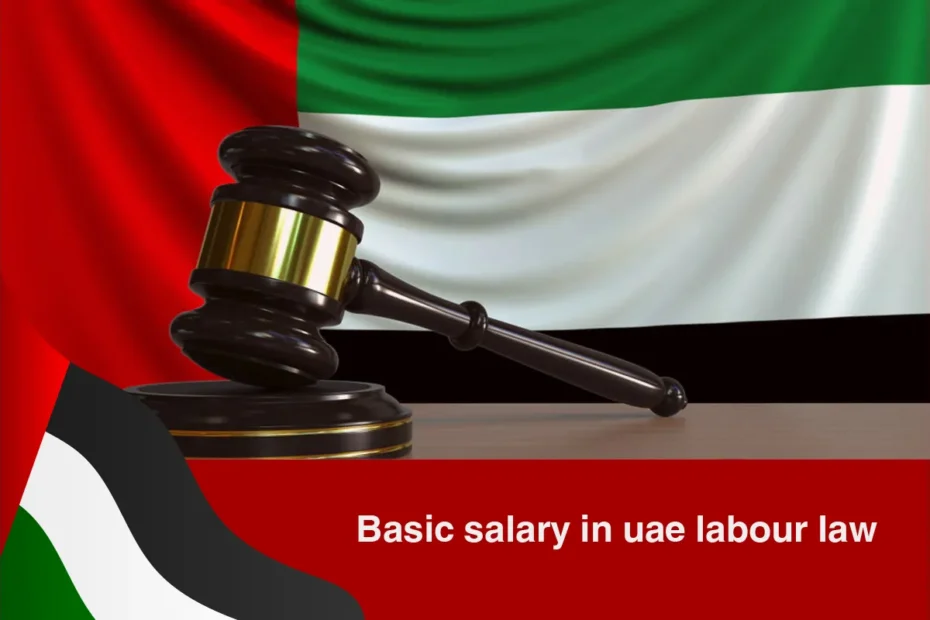This article provides information about basic salary in UAE labour law, exploring its definition, percentage, and new rules.
Contact Al Mulla Labor Lawyer in Dubai. Click the WhatsApp icon below or go to the Contact Us page. Locations: Dubai, Abu Dhabi and Ras Al Khaimah.
Table of Contents
Basic salary in UAE labour law
Basic salary refers to the remuneration agreed upon in the employment contract, exclusive of allowances, benefits, or expenses. It is the payment an employee receives in recognition of fulfilling their contractual obligations.
In the new UAE Labour Law (Article 1), the basic wage is defined as the remuneration specified in the employment contract, paid to the worker for his efforts under the employment agreement.
This payment can be made monthly, weekly, daily, hourly, or piecework, excluding any other allowances or benefits in kind.
Salary rules in UAE 2024
The treatment of commissions and bonuses in basic salary is not explicitly defined in the old or new labour law. Therefore, their inclusion or exclusion primarily depends on the contract terms between the employer and employee.
However, according to legal experts at Al Mulla Labour Lawyers & Legal Consultants, the Dubai Court of Cassation clarifies this matter.
The salary includes everything given to the employee for the work performed, in cash or kind.
Therefore, any remuneration not classified as an allowance is considered a basic salary as long as it relates to the work performed.
Considering this, employers should clearly define the treatment of commissions and bonuses in their employment contracts.
UAE labour law salary calculation.
As per the new labour law, the wage is defined as the sum of the basic wage and the cash allowances and benefits in kind allocated to the worker under the employment contract.
Simply put, the wage (or salary) equals the basic salary plus benefits and allowances.
Allowances can encompass various aspects, including housing, transport, communication, and children’s school fees. The combined total of basic salary and allowances constitutes the gross salary per UAE labour law.
Specifying the applicable allowances in the employment contract is essential to avoid legal complications and disagreements.
Basic salary percentage in UAE labour law
Is There a Minimum Wage in UAE?
No specific minimum wage is stipulated in the UAE labour law. Furthermore, there is no mentioned percentage for the basic or gross salary.
However, the basic salary in UAE labour law constitutes 60% of the gross salary, with allowances making up the remaining 40%.
While there is no established minimum wage, the UAE labour law mandates that the wages must be adequate to meet the basic needs of employees.
Article 27 of the new law also provides a provision for the Cabinet to issue a resolution determining the minimum wage for workers or any category thereof, indicating the possibility of minimum wage legislation.
FAQs about basic salary UAE labor law
Conclusion about basic salary in UAE labour law.
- Basic salary is the compensation an employee receives based on his or her employment contract, excluding allowances and other benefits.
- Understanding the concept of basic salary in the UAE labour law is crucial as it forms the basis for the net salary of your employees.
- Basic salary also plays a significant role in determining an employee’s annual leave and end-of-service gratuity.
- The inclusion or exclusion of commissions and bonuses in the basic salary primarily depends on the employer.
- While there is no specific minimum wage in the UAE labour law, employers must pay their employees sufficient to meet their basic needs.
In legal matters, particularly those related to labour issues, it is always recommended to seek expert advice.
Al Mulla, Labor Lawyer & Legal Consultant, is a trusted resource for labour cases in the UAE. With their expert knowledge and guidance, you can confidently navigate the complex world of labour law.
Contact Al Mulla Lawyers today! Click the Whatsapp icon below or visit our Contact Us page.
Find us at these locations:
– Dubai: Deira, Port Saeed, Street 8, City Avenue Building, Office 705-708.
– Abu Dhabi: Corniche Street, Golden Tower, Office 22.
– Ras Al Khaimah: Al Nakheel, Al Maamoura Building (Emirates NBD Bank Building), Fourth Floor.
We recommend you read about when an employee needs an employment lawyer in UAE Dubai and The Top 10 Labour Lawyers in UAE Dubai.
A legal consultant specializing in UAE labor law. He regularly publishes articles on the website and writes on various areas of UAE law, with a specific focus on labor law.
